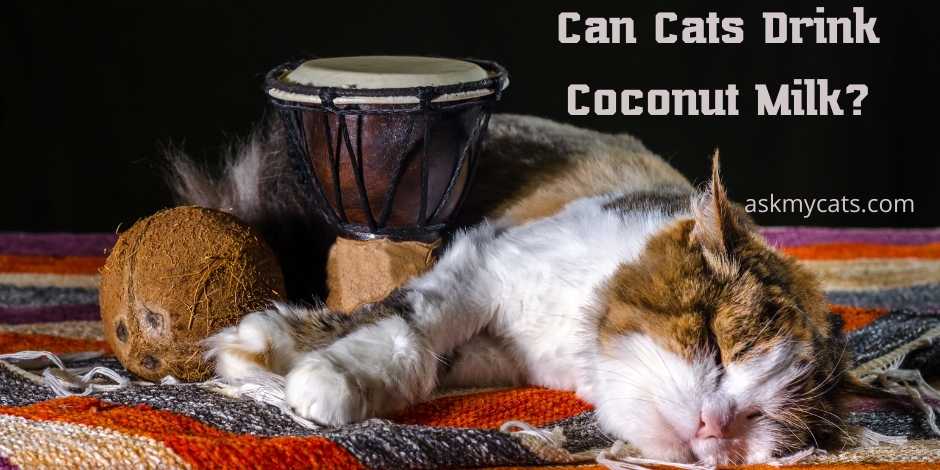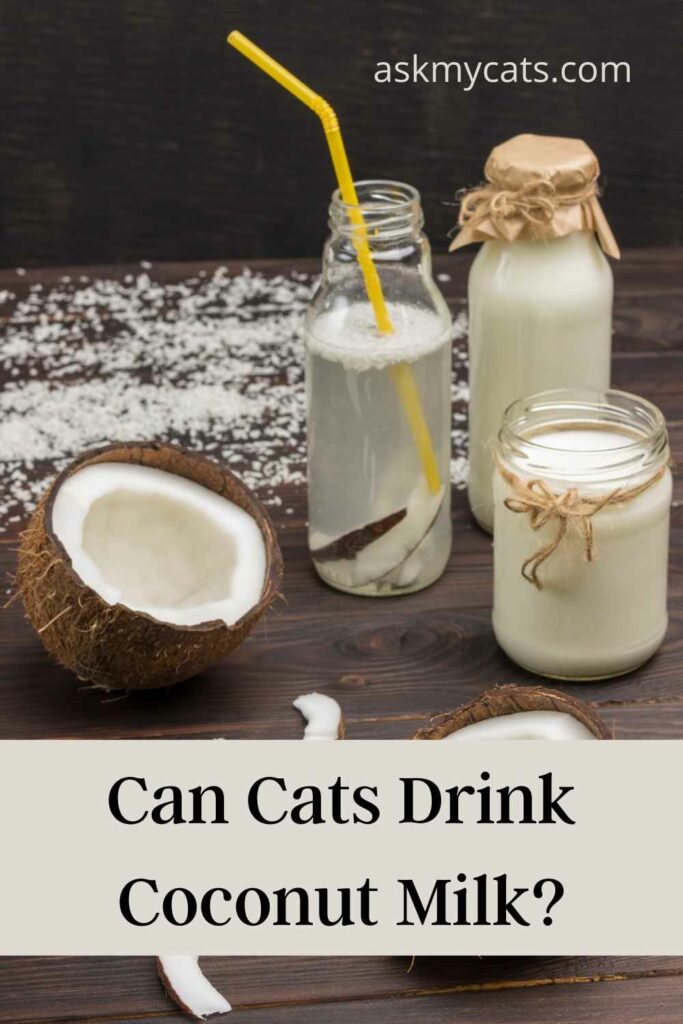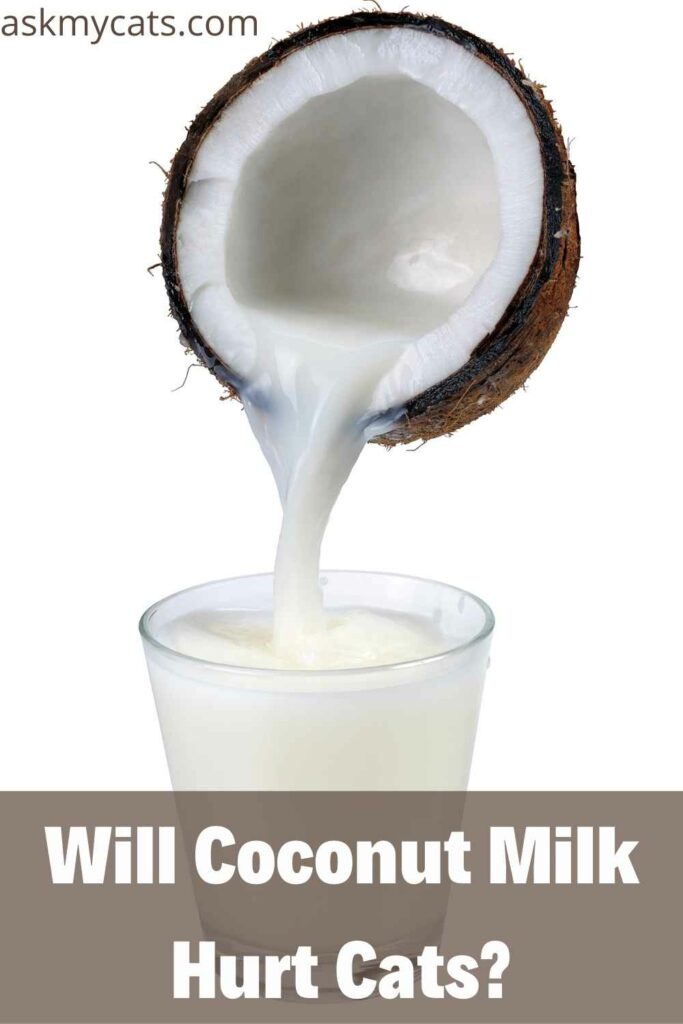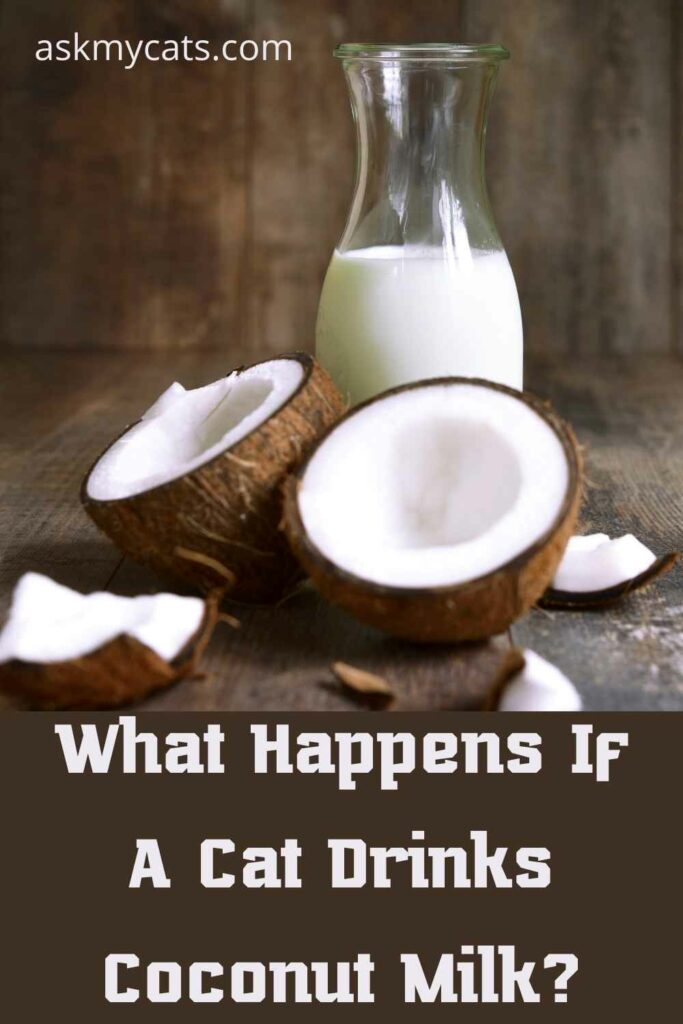A cat’s need for milk is an age-old story. However, because of advances in feline nutrition, we now know that cow’s milk is really harmful to cats.
So, what are your alternatives for giving your kitten a nice drink of milk? Is it okay for cats to consume coconut milk? Coconut milk is safe for cats, but is it nutritious?
Coconut milk isn’t poisonous for cats, but it’s also not advised. Even when compared to cow’s milk, coconut milk is considered too rich in fats and oils; therefore you shouldn’t give your cats even a small amount.
Plant proteins are also difficult for cats to digest. Coconuts as previously stated fall within this group. Keep reading this article to know more about this matter!


Give Your Cat the Perfect Day
Get the Free Ebook!
Can Cats Drink Coconut Milk?
Cats are not poisoned by coconut milk. Many animal nutritionists, however, advise against it due to its high fat and oil content as compared to cow’s milk. If you’re going to provide coconut milk to your cat, do it in modest amounts.

Plant proteins are notoriously difficult for cats to digest.
It is lactose-free, which means it is easy to digest for cats. It’s usual for individuals to feed their cats their favorite foods. Don’t overdo it with the coconut oil, though. Dairy products are generally bad for cats since they cause them to become lactose intolerant as they become older.
Coconut milk, on the other hand, is lactose-free, unlike dairy milk. The only drawback is that there is too much oil and fat in it.
Plant proteins are difficult for cats to digest, and because coconuts are fruits from a palm tree, they are particularly high in these plant proteins.
When you look at the coconut fruit, you’ll see that it’s a botanically intriguing fruit. Actually, it’s seeds, nuts, and fruits, which aren’t ideal for a cat’s diet.
Coconut water contains vitamins and minerals that are beneficial to cats’ health. As a basic fluid intake, you have regular fresh water on hand at all times.
Giving your cat three teaspoons of coconut milk at a time is the best way to go. For the next 12 hours, keep an eye on their health for any indications of gastrointestinal distress.
You might like to read Can Cats Drink Coconut Water? Is It Safe For Them?
It’s acceptable to offer your cat coconut milk as a treat now and again. The milk does not include all of the nutrients that your kitties require. As a result, only use tiny quantities of milk if you are anxious to share it with them.
Milk should never be given to a cat on a regular basis, and it’s especially bad for a weaning kitten.
Domestic cats acquire the majority of their nutrition from commercial cat food, as well as water. It indicates that milk is not a natural part of their diet and that cats do not require milk. Dairy products with high-fat content are preferred by cats.
Will Coconut Milk Hurt Cats?
Yes, coconut milk can hurt cats. Although it isn’t strictly deadly or harmful to cats, the amount of oil and fat in coconut milk means that it’s not something you should give your cat on a daily basis.

There shouldn’t be anything to be concerned about if your cat appears to enjoy a few drinks of coconut milk. It’s unlikely that your cat would be harmed if it eats “limited amounts” of “coconut and coconut-based goods.”
So, if you discover your cat has ingested some coconut milk, keep an eye on him to make sure he doesn’t have any acute adverse effects like diarrhea or vomiting.
There are several reasons why you should avoid giving coconut milk to your cat.
To begin with, owing to the relatively high quantities of oil in coconut milk, it is possible that it can cause your cat to have diarrhea or an upset stomach.
Coconut milk is also heavy in fat, which might contribute to feline obesity if your cat consumes it on a regular basis.
Aside from the fat and oil content, commercial types of coconut milk are likely to contain other chemicals and additives that might damage your cat.
Coconuts grow on coconut trees in tropical areas and are commonly utilized in Southeast Asian and Thai cuisines, as most of us well know.
Coconuts contain both water and flesh, and it’s worth noting that coconut milk does not normally form inside the coconut. Coconut water is extracted when coconuts are immature when they are green in hue.
Coconut milk is made when the flesh of the coconut is mixed with water as it matures and turns brown (which contains about 50 percent of water).
Find out more details about Can Cats Eat Coconut? Is Coconut Safe For Cats?
What Happens If A Cat Drinks Coconut Milk?
Almost one-third of cats have shown signs of food allergy, such as casein and lactose intolerance after drinking coconut milk. Most cats, on the other hand, are not sensitive to lactose or casein. Allergies are most commonly shown as gastrointestinal discomfort or skin problems such as hives and redness.

Milk allergies manifest themselves in the stomach as edema, congestion, or villi degeneration. Hemorrhage or an increase in plasma cells can occur in cats. Although the allergies appear to be serious, you may effectively control them by avoiding specific foods that trigger allergies in your cat.
Allergies appear to be serious, yet they may be handled successfully. All you have to do is stay away from the items that trigger your allergy.
Cats don’t have favorite milk; therefore it’s natural for people to wish to share a small quantity of their milk with their feline companion.
When feeding your cat coconut milk or any other milk, start with tiny amounts to ensure that your cat does not develop an intolerance.
Pasteurized or high-carb milk should not be given to the cat. For further information about allergies and the suggested nutrition or diet, see your local veterinarian.
Small quantities of this milk are OK and provide them with the pleasure they want from time to time when they are with you. However, you must use caution to avoid giving the kitten intestinal trouble. Lactose-free milk is a healthier alternative.
Some vegans choose to use milk substitutes available at pet stores.
Raw milk is preferable to other forms of milk since it has fewer harmful effects on newborn kittens. Pasteurized milk has been linked to skeletal deformities, reproductive problems, and developmental deficits.
The worst type of milk to feed your cat is sweetened or condensed milk. Furthermore, evaporated milk is harmful to pets. Excess carbs in milk aggravate gastric discomfort.
Many people believe it to be nutritious food and include it in their culinary recipes. This isn’t to say that it’s a nutritious supplement to the cat’s diet. Keep an eye out for signs that your cat is happy or healthier.
Coconut milk is thought to be beneficial for cats by 72 percent of individuals. The premise is that if milk is beneficial for people, it must be good for cats as well.
Cats are carnivores, which means they eat meat for virtually all of their meals. Most cats, on the other hand, like trying out the drinks and foods that their owners consume. Coconut milk is a favorite of certain cats.
The easiest approach to cope with coconut milk is to give it to your cat in little doses to keep them happy and healthy. Long-chain saturated fats are the ones you avoid, which is why moderation is so important.
Because your cat’s health is essential, you should only give it a few tablespoons of coconut milk rather than a whole bowl.
The information provided above should help you decide whether or not to offer coconut milk to your cat. When feeding coconut milk to your cat, exercise cautions since you don’t want to overfeed your cat with fats and oils. Before you start feeding your cat coconut oil, talk to your veterinarian.
In fact, you must use extreme caution to prevent endangering your cat’s health.
Check out Can Cats Have Coconut Oil? How To Use Coconut Oil For Cats?
Can You Give Kittens Coconut Milk?
No, it is not advisable to feed kittens coconut milk since their stomach is not ready to digest it.
Can Cats Drink Coconut Almond Milk?
Coconut Almond milk is safe for cats to drink in moderation.
Coconut Almond milk, unlike cow milk, does not include any dairy ingredients – after all, it is composed of almonds. Almonds are lactose-free, which is a chemical that most felines cannot tolerate.
Almond milk also doesn’t include any additional components that are known to be harmful to cats. However, because almond includes a few chemicals that may irritate your cat’s stomach, veterinarians advise avoiding them.
Can Cats Drink Canned Coconut Milk?
Canned coconut milk is also not prescribed to feed your cats.
Coconut and coconut-based goods in small amounts should not be harmful to dogs. Fresh coconuts, on the other hand, contain oils that might induce diarrhea, loose stools, and stomach problems.
Because of the high potassium content in coconut water, pets should avoid it as well.
Can Cats Eat Coconut Milk Ice Cream?
Yes, your cat can consume coconut milk ice cream since it is not hazardous to cats. If your cat eats some coconut milk ice cream, it is extremely unlikely that it will become gravely ill.
Your cat can consume part of this delectable delicacy, but it may not be as simple as you think.
Make sure the coconut ice cream you’re giving your cat doesn’t have any artificial sweeteners in it. Cats are poisoned by sweets such as xylitol.
Making coconut ice cream at home is the easiest way to ensure your cat enjoys it.
When compared to store-bought coconut ice cream, homemade coconut ice cream is a healthier and better alternative. This is because you will know exactly what substances were utilized and that they are not harmful to your cat.
You might be surprised to learn that your cat enjoys eating coconut ice cream. The high-fat level in ice cream attracts and draws most cats, and it has nothing to do with the flavor of the ice cream.
Also, check out can cats have rice milk
Can Cats Eat Coconut Cream?
Like coconut milk, you shouldn’t give your cat too much coconut cream.
Coconut cream is just coconut milk that has been thickened by removing some of the water.
To offer the kitten a particular treat, several shops sell coconut creams with extra sugars and other ingredients. Coconut water, on the other hand, is safe for cats and beneficial to their health. You may also offer coconut water to your other pets, such as dogs.
Frequently Asked Questions
Why do cats love coconut milk?
Small quantities are OK if your cat loves it and you can persuade them to drink it. Coconut, whether in the form of fruit, oil, milk, or water, is difficult for cats to digest. No concerns if your cat drank from your coconut milk glass. They won’t be damaged in any way.
Can dogs drink coconut milk?
Coconut milk is not harmful to dogs and may even provide certain health advantages, such as boosting the immune system, refreshing the breath, and enhancing the look of the coat. Too much coconut milk or coconut milk-based meals, on the other hand, may cause your dog to have diarrhea or loose stools.
Is coconut poisonous to cats?
When consumed in small amounts, coconut and coconut-based goods are unlikely to cause significant harm to your pet. Fresh coconut flesh and milk contain oils that can induce stomach discomfort, loose stools, and diarrhea.
Final Words
Giving the cat coconut milk is the equivalent of feeding it junk food. Basically, the milk dilutes other nutrients from better dietary sources, so they don’t gain any nutritional benefit.
Long-term and frequent feeding of milk to cats has detrimental consequences on their fertility, lifespan, bone structure, and growth. Coconut milk, in general, is harmful to a cat’s health.
Please leave your questions about your pet friend’s feeding habits in the comments section below. We’ll get back to you as soon as possible.
Interesting Read: Can Pregnant Cats Drink Milk?
